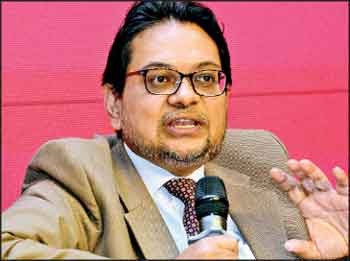Monday Feb 23, 2026
Monday Feb 23, 2026
Saturday, 22 February 2025 01:01 - - {{hitsCtrl.values.hits}}
 |
| Verité Research Executive Director Dr. Nishan de Mel |
By Charumini de Silva
A top economist this week raised concerns over the Government’s revenue and taxation policies, particularly its overestimated approach for Excise duties on cigarettes.
Verité Research Executive Director Dr. Nishan de Mel criticised the persistent overestimation of tax revenue from the cigarette industry, pointing out that actual collections have consistently failed to meet the projected outcomes outlined in the Budget.
“Official Budget projections continue to overestimate tax revenues from the sector, with actual collections consistently falling short of expectations,” he said, highlighting the discrepancy between projections and actual revenue as a significant issue in the Government’s fiscal planning.
Speaking at a panel discussion organised by the CA Sri Lanka Budget Seminar 2025, he said that Sri Lanka has consistently failed to meet the budgeted revenue target on cigarettes since 2019.
Dr. de Mel said the Government expects Rs. 130 billion in excise revenue from cigarettes in 2025 and to achieve this excise taxes were increased by 5.9%.
However, he said that the 5.9% tax hike which came into effect from 11 January 2025 was not sufficient to meet the Rs. 130 billion excise revenue from cigarettes.
“Our estimates show an additional 12.7% increase in excise taxes is needed to meet the revenue target,” Dr. de Mel said, adding that alternatively cigarette sales would need to increase by 18% beyond 2022 levels — an unlikely scenario given the downward trend in its sales.
“If neither of these adjustments occurs, Sri Lanka will face a 10% excise revenue shortfall in 2025,” he claimed.
Despite other tax rates have increased, especially post-economic crisis, Dr. de Mel said the effective tax rate on cigarettes has fallen from 74% to 67%, marking the lowest level in recent history.
“Regardless of this tax reduction, the official Budget projections continued to overestimate tax revenues from the sector with actual collections consistently falling short,” he pointed out.
The discrepancy, Dr. de Mel argued, reflected either an unrealistic forecasting model or deliberate manipulation to justify lower taxation on an industry with strong lobbying influence.
He pointed out that while the Government’s share of cigarette tax revenue had risen by only 27% since 2017, the industry’s post-tax revenue had surged by 92%, suggesting a growing imbalance that favoured corporate profits over public funds.